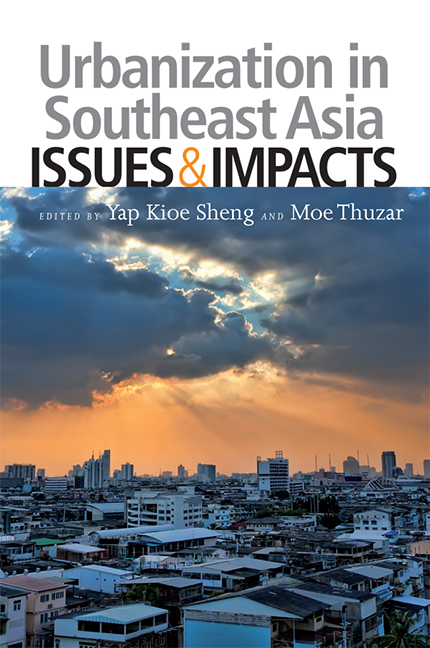Book contents
- Frontmatter
- Contents
- Message from Head, ASEAN Studies Centre
- Message from Director, Centre for Liveable Cities
- About the Contributors
- Introduction
- Urbanization in Southeast Asian Countries: Recommendations
- 1 The Challenges of Promoting Productive, Inclusive and Sustainable Urbanization
- Cities as Engines of Development
- 2 ASEAN Transport Policy, Infrastructure Development and Trade Facilitation
- 3 Competitive Cities and Urban Economic Development in Southeast Asia
- 4 Public-Private Partnerships and Urban Infrastructure Development in Southeast Asia
- 5 Regional Cooperation and the Changing Urban Landscape of Southeast Asia
- Inclusive Cities
- Cities and the Environment
- Governance, Decentralization, and Urbanization
- Urbanization from an ASEAN Perspective
- Index
3 - Competitive Cities and Urban Economic Development in Southeast Asia
from Cities as Engines of Development
Published online by Cambridge University Press: 21 October 2015
- Frontmatter
- Contents
- Message from Head, ASEAN Studies Centre
- Message from Director, Centre for Liveable Cities
- About the Contributors
- Introduction
- Urbanization in Southeast Asian Countries: Recommendations
- 1 The Challenges of Promoting Productive, Inclusive and Sustainable Urbanization
- Cities as Engines of Development
- 2 ASEAN Transport Policy, Infrastructure Development and Trade Facilitation
- 3 Competitive Cities and Urban Economic Development in Southeast Asia
- 4 Public-Private Partnerships and Urban Infrastructure Development in Southeast Asia
- 5 Regional Cooperation and the Changing Urban Landscape of Southeast Asia
- Inclusive Cities
- Cities and the Environment
- Governance, Decentralization, and Urbanization
- Urbanization from an ASEAN Perspective
- Index
Summary
INTRODUCTION
Cities are now the homes of more than half the population in the world. In fact, it is projected that more than 70 per cent of the world's population will be living in urban areas by 2030. Though most cities have higher economic growth, foreign investment, and labour productivity than the rest of the country, they are also more polluted, crime ridden, and socially disparate. Successful cities attract talented, young, highly-skilled workers, are centres of innovation and entrepreneurship, and are competitive locations for global and regional headquarters. The proximity of universities to research and production facilities means cities are where new products are developed and commercialized. It is reported that more than 80 per cent of patents are filed in cities. Empirical studies based on within-country information show a strong positive connection between density and productivity; transition to dense urban living seems to be part of the process of a country becoming richer over time (Glaeser and Gottlieb 2009).
Indeed, the rapidly rising degree of worldwide urbanization has led to the growing recognition that cities and their surrounding urban regions play a vital role in national economic competitiveness. A book co-authored by M. Weiss and H. Cisneros entitled, Teamwork: How Cities and Suburbs Develop Metropolitan Economic Strategies to Innovate and Prosper in the Global Marketplace asserts that cities and the metropolis — urban regions — are the fundamental building blocks of prosperity and quality of life, both for the nation and for families and communities.
However, one should not assume that cities do not falter. The OECD Territorial Reviews (2003) reports that cities such as Berlin, Fukuoka, Naples, and Pittsburgh perform below the national average for income, productivity, skills, and employment. There are also indications that mega-size cities — those with more than seven million people — such as Seoul, Mexico City, Istanbul, and Tokyo — have outgrown the economies of scale normally associated with cities. In a study of eight Asian cities, it is reported that “urban development in Asia is largely driven by the concentration of local, national and increasingly, international profit-seeking enterprises in and around particular urban centres” and that “cities may concentrate wealth both in terms of new investment and high income residents but there is no automatic process by which this contributes to the costs of needed infrastructure and services”.
- Type
- Chapter
- Information
- Urbanization in Southeast AsiaIssues and Impacts, pp. 115 - 138Publisher: ISEAS–Yusof Ishak InstitutePrint publication year: 2012



